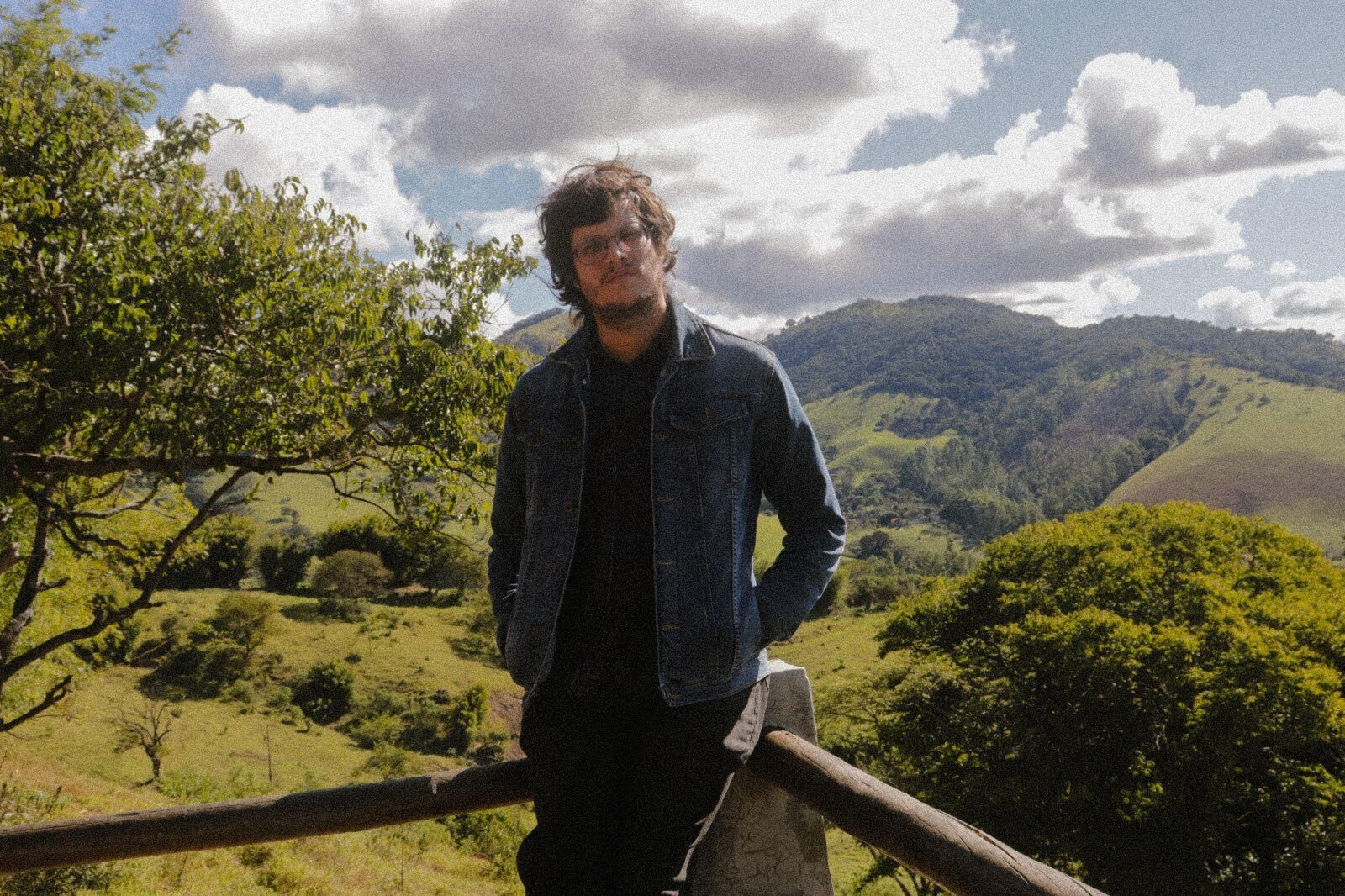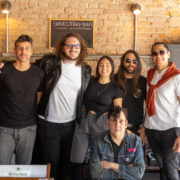
The Capim Cósmico project, led by musician and composer Mateus Cursino, released the single “Que Pó Não Vicia” on 14 November, available on all platforms through Marã Música. The track inaugurates the sound of the upcoming album and reaffirms the self-reflective, confessional and ironic character that marks the artistic identity of the project, transforming personal experiences into poetic and collective material.
The inspiration for the composition came after he was diagnosed with diabetes, which led the artist to reflect on sugar as an addictive substance and, metaphorically, on everything we consume — physically or emotionally. Recorded entirely independently, with Cursino playing all the drums, bass, guitar and vocals, the single has a raw and nostalgic aesthetic, deeply influenced by 1990s alternative indie, with references such as Nirvana, Pavement and Dinosaur Jr.
With a bass riff as its starting point and an intuitive musical structure, “Que Pó Não Vicia” offers multiple interpretations and transforms an intimate experience into broader reflection. For Mateus, the track’s power lies precisely in the possibility that the audience will recognise layers of a universal theme in their own particular experiences. According to the artist, the release represents a moment of enthusiasm and marks his second partnership with the Marã Música label, as well as paving the way for the new album coming soon.
You describe sugar as a ‘socially accepted drug’, something addictive and potentially destructive. At what point did this perception cease to be merely a medical observation and become poetry? Was there a phrase, a scene or a feeling that triggered the music inside you?
I recently discovered that I am diabetic, and this caused me to feel desperate at the beginning of the diagnosis. Then I remembered an uncle of mine who had his legs amputated and went blind before he died because of diabetes, and when I visited him as a child, I saw his condition in a frightening way. I think that memory from my childhood was a trigger, and then the emotion overflowed through several compositions that are part of the first album of the Capim Cósmico project.

The title “Que Pó Não Vicia” (What Powder Isn’t Addictive) is ironic, provocative, and open to interpretation. When you wrote it, were you laughing nervously, laughing at yourself, or laughing at the world?
Good question, maybe I was laughing at the world, ha ha ha. It’s funny that for many in society, the villain is always what is considered illegal. And we live with sugar or even alcohol on a daily basis in such a subtle way. People demonise drugs like marijuana and sometimes forget about other excesses that cause illness and death all the time. I come from a small town in southern Minas Gerais that has a cachaça factory. Every day I see people corrupting themselves with one more drink in any corner bar, including my friends. So, what sometimes seems routine is not always the best path.

You turned a diabetes diagnosis into art — which is quite an act of courage. Was it a process of healing, rebellion, or just an attempt to organise chaos through strings and distortion?
I have always transformed my frustrations into art. Perhaps until now, nothing has been as relevant as it is now. What has always been chaotic in my life, whether a relationship or a simple everyday situation, has somehow turned into music. However, at this stage of my life, I really have something to say, or rather, something to worry about. Of course, exposing yourself is not always ideal and can be somewhat embarrassing. So, I try to make my music as subtle as possible. Now I am in a more mature phase, and the Capim Cósmico project reflects this moment of ‘organising’ myself internally.

The alternative rock of the 1990s — Nirvana, Pavement, Dinosaur Jr — carries an aesthetic of misfit, friction, and brutal sincerity. What is it about that sound that speaks to your current moment? Is it nostalgia, identification, or refuge?
It’s funny to revisit this type of sound now that I’m over 30 years old. Nirvana was essentially a youth band in the 90s, right? But this type of sound seems to me to be the most vital in the current climate of plasticised music, full of Artificial Intelligence or even perfectionism, where everything is edited, manipulated and tuned note by note. Many albums are made with the click of a mouse. In all the bands mentioned above, we still had something visceral, simple and organic. Something that rock has lost over the years. Perhaps the 90s represented alternative rock as it will never be done again. Many bands lost their way by becoming mainstream. So, I believe there is something nostalgic in me coming to the surface.

You recorded everything yourself: drums, bass, guitar and vocals. What is liberating and what is lonely about this “do-it-all” format? Did you ever feel like you missed having someone else in the studio, or was it precisely about being alone with yourself?
It was really urgent, you know? And I had just broken up another band, Velhos Aspargos, where everything was slower and there was a constant battle of egos. Opinions weren’t formed, everyone wanted something different. Or else nothing was productive in the studio and we did very little original work. Finishing one project and starting another on my own was liberating. I needed that moment alone in the studio and it was great. I went straight into recording an album with sheer willpower. I don’t think I’ll do that again anytime soon, but the album represents an important moment for me. And it serves as a record of that.
If this song were a scene from a film, a still image or a blurred photograph, what would be the visual setting for this “addiction” that cannot be named?
I think the cover photo reflects the song very well overall. It was a brilliant idea that Henrique da Marã gave me. I took a photo of a cup of coffee filled with sugar. I wondered what would have happened to me if I had drunk that whole cup. Better not to imagine, lol.
The lyrics come from something intimate, but you make a point of leaving them open, almost collective. What do you secretly hope people will find in this song: identification, discomfort, laughter, relief… or no ready answer?
Great question, once again lol. I believe I always try to get people to identify with my songs, even if they don’t understand the lyrics completely. I was very happy with a comment I received on YouTube right after releasing the song. One of the phrases in the comment was: “I couldn’t describe my moment any better.” The person in question immediately identified with the song without even knowing about the Capim Cósmico project. It was such a spontaneous comment that it made me feel completely fulfilled with the release.
This single paves the way for a new album. If “Que Pó Não Vicia” is the gateway, what emotional rooms do you still intend to open in this next work? Can we expect more confession, more irony, or more sonic impact?
The album has everything you mentioned. Some passages are closely linked to emotions and fears, and there is also a lot related to the diagnosis of the disease and my fear of the consequences that may come in the not-so-distant future. There is also experimental music, music with heavy choruses and striking riffs. It’s a beautiful debut album, I think I managed to sum up everything I feel and the sound I like in 10 tracks. I believe there are still many people who will identify with it.
Follow Capim Cósmico on Instagram


